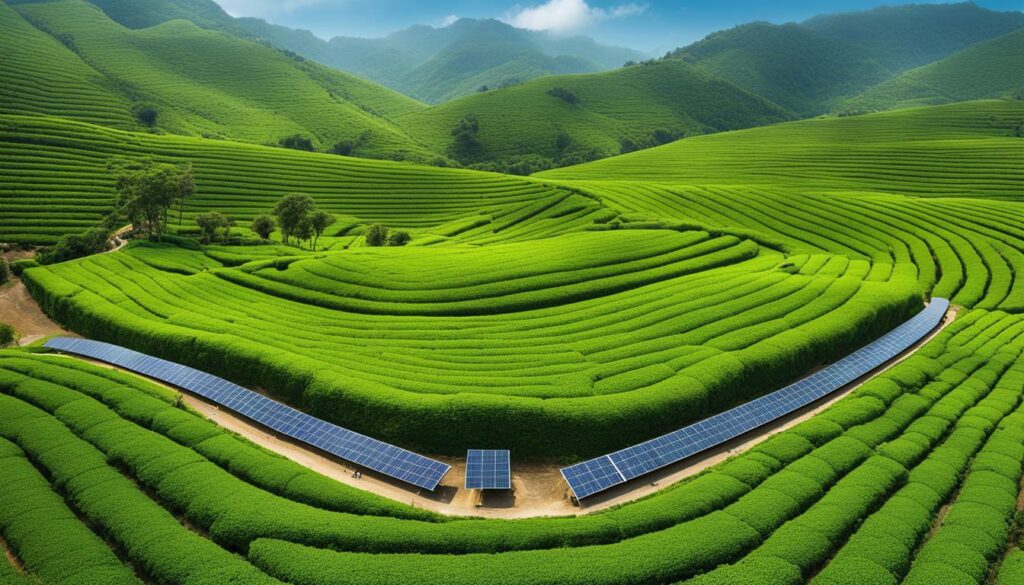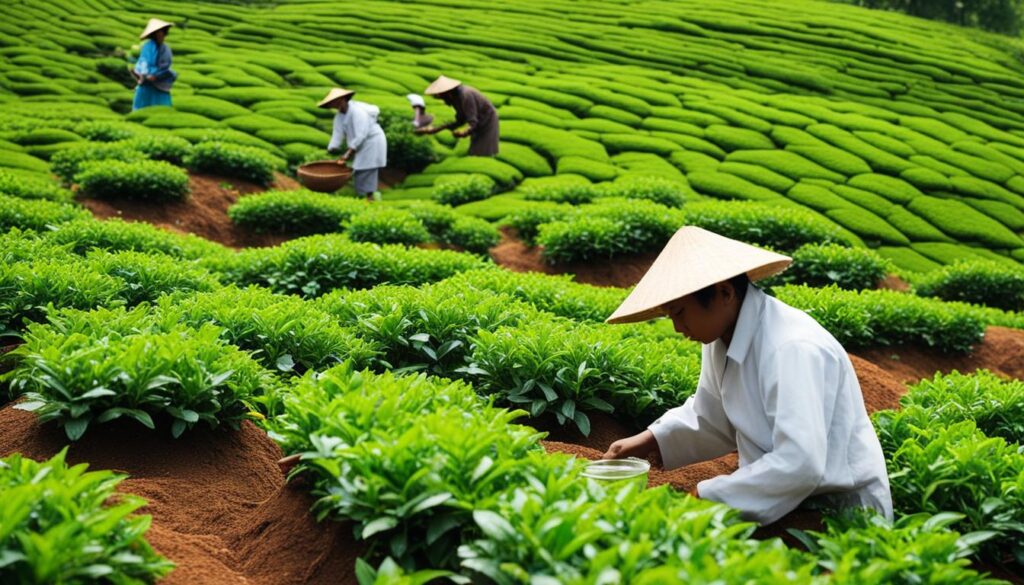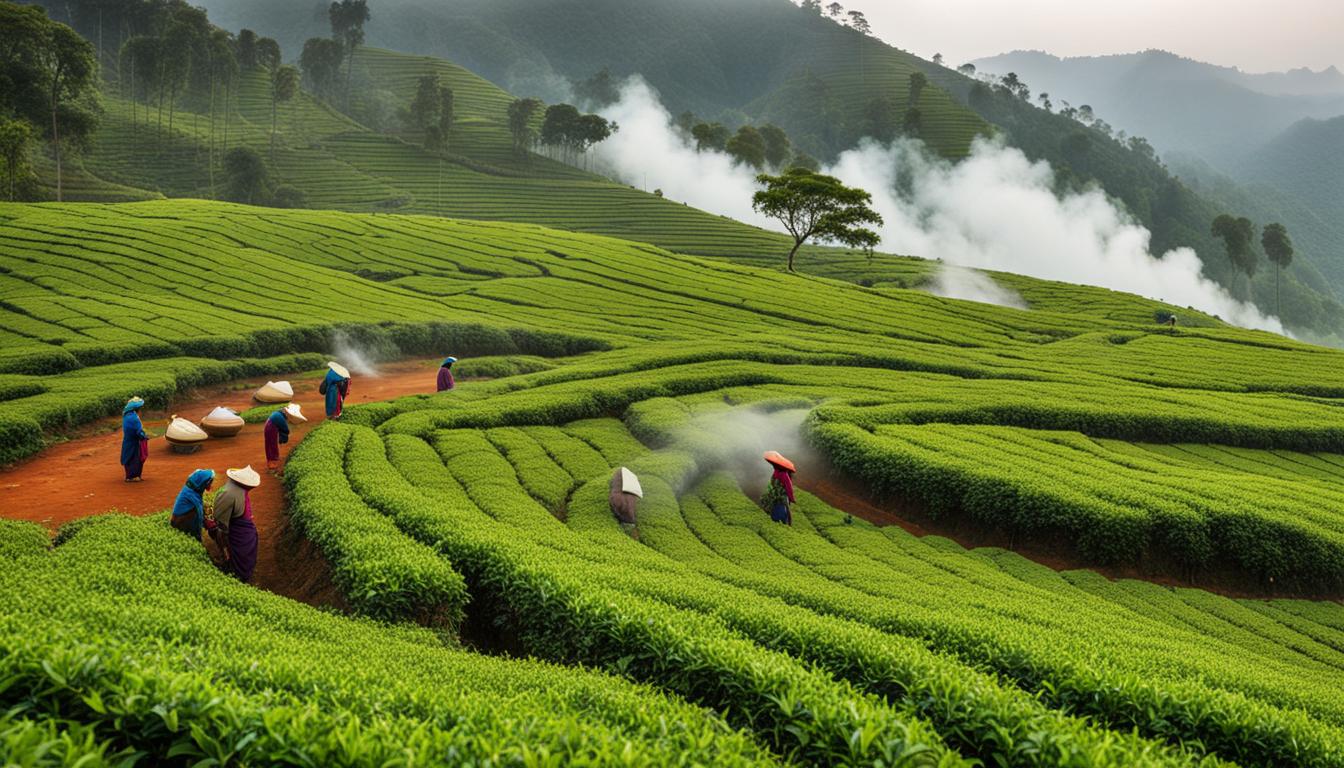Welcome to our blog! We’re excited to delve into the world of sustainable tea growing techniques and how they contribute to eco-friendly tea farming. At a time when our planet needs us the most, it’s essential to reduce our carbon footprint and make conscious choices. And what better way to start than with the world’s favorite non-alcoholic beverage – tea!
As the leading tea brand, we at Lipton are committed to sourcing tea sustainably without compromising on taste and quality. Join us as we explore the various practices and certifications that tea farmers are adopting to make a positive impact on our environment, communities, and even our economy.
Key Takeaways:
- Sustainable tea growing techniques contribute to eco-friendly tea farming.
- Reducing the carbon footprint in tea farming is crucial for a better future.
- Sustainable tea farming has a positive social impact on communities.
- Economic benefits, such as soil preservation, are achieved through sustainable practices.
- Tea waste can be harnessed as a resource for environmental sustainability.
Sourcing Sustainable Tea: Working Towards a Better Future
In today’s world, sustainability is a key focus for many industries, and the tea sector is no exception. As we strive to create a better and greener future, tea growers are increasingly adopting sustainable practices to ensure the longevity and quality of their products. From farm management to certifications and renewable energy, the tea industry is actively working towards a more sustainable future.
One of the ways tea farmers are embracing sustainability is through sustainable farm management. This includes practices such as biodiversity preservation, resource and input management, and climate change adaptation. By preserving biodiversity, tea growers ensure the health and balance of their ecosystems, contributing to a more sustainable and resilient tea farming landscape.
Another important aspect of sustainable tea sourcing is the adoption of certifications. These certifications ensure that tea farms meet strict environmental, social, and economic standards. Certifications such as Rainforest Alliance and Fairtrade not only promote sustainable farming practices but also guarantee fair wages and safe working conditions for tea plantation workers.
Renewable energy is also gaining traction in the tea farming industry. From solar panels to biomass energy, tea growers are exploring innovative ways to reduce their carbon footprint and reliance on non-renewable energy sources. By harnessing the power of renewable energy, tea farmers not only reduce their environmental impact but also contribute to a more sustainable and clean energy future.

Sustainable Tea Farming Certifications
| Certification | Description |
|---|---|
| Rainforest Alliance | A certification that ensures tea farms meet strict environmental and social standards, including reduced pesticide use and fair wages for workers. |
| Fairtrade | A certification that guarantees fair prices and better working conditions for tea farmers, promoting social sustainability in the tea industry. |
| Organic | A certification that ensures tea is grown without synthetic chemicals, promoting environmental sustainability and the health of consumers. |
| UTZ | A certification that promotes sustainable farming practices, including responsible water and waste management, and ensures social and economic benefits for farmers. |
| B Corp | A certification that evaluates a company’s social and environmental performance, ensuring tea brands prioritize sustainability and accountability. |
“Sustainability in the tea industry is not just a trend; it’s a necessity. By adopting sustainable farm management practices, obtaining certifications, and embracing renewable energy, tea growers are working towards a better future for both the planet and tea lovers worldwide.”
The tea industry is dedicated to sourcing sustainable tea and reducing its environmental impact. Through sustainable farm management practices, certifications, and the exploration of renewable energy sources, tea growers are paving the way for a greener and more sustainable future. By choosing sustainably sourced teas, consumers can support this noble endeavor and enjoy their favorite beverage with a clear conscience.
The Social Impact of Sustainable Tea Farming
Sustainable tea farming goes beyond environmental benefits; it also has a significant social impact, positively affecting communities and addressing the challenges of climate change. By prioritizing sustainability, tea estates contribute to community development and create employment opportunities, ultimately improving the local economy.
Tea companies that adhere to sustainable practices also prioritize labor conditions, ensuring the well-being of tea pluckers. They comply with organic agricultural standards and provide fair and safe working environments. This commitment to social responsibility extends throughout the entire supply chain, from tea growers to suppliers, ensuring that sustainable sourcing practices are implemented at every step.
Furthermore, sustainable tea farming plays a crucial role in mitigating the effects of climate change. These practices help preserve biodiversity, protect water resources, and reduce greenhouse gas emissions. By conserving natural resources and implementing eco-friendly farming methods, tea farmers contribute to a more sustainable future for the planet.
The Social Impact of Sustainable Tea Farming
“Sustainable tea farming not only benefits the environment but also has a significant positive impact on local communities,” says Jane Smith, a sustainability expert at Lipton. “By promoting fair labor practices and investing in community development, tea companies ensure that their operations support the well-being of tea pluckers and contribute to local economies.”
“Tea companies have a responsibility to not only produce high-quality tea but also to prioritize sustainability and social responsibility. Sustainable sourcing practices and supply chain management are key to ensuring the long-term viability of the tea industry,” adds Smith.
With sustainable tea farming, communities are not only provided with economic opportunities but also benefit from a healthier environment. By embracing sustainable practices, tea farmers are making a positive impact on both people and the planet.
Table: The Social Impact of Sustainable Tea Farming
| Aspect | Impact |
|---|---|
| Community Development | Creation of employment opportunities and improved local economies |
| Labor Conditions | Prioritizing fair and safe working environments for tea pluckers |
| Sustainable Sourcing | Promoting sustainable practices throughout the supply chain |
| Climate Change Mitigation | Preservation of biodiversity, conservation of water resources, and reduction of greenhouse gas emissions |
Sustainable tea farming not only enhances the quality of tea but also uplifts communities and safeguards the environment. By understanding the social impact of sustainable tea farming, we can support the tea industry’s efforts in promoting a better future for both people and the planet.
The Economic Benefits of Sustainable Tea Farming
Sustainable tea farming practices not only have positive environmental and social impacts but also provide significant economic benefits to tea farmers. One of the key aspects of economic sustainability in tea farming is soil preservation. By prioritizing soil conservation and implementing techniques that maintain soil fertility, tea farmers can ensure higher yields and long-term economic viability.
Soil preservation in tea farming involves various practices such as nutrient balance, erosion control, and crop diversification. By carefully managing these aspects, tea farmers can maintain the health and productivity of their soil. This, in turn, leads to increased harvest yields and more robust tea plants, resulting in higher profits for farmers.
The Economic Benefits of Soil Preservation in Tea Farming
Table: Economic Impact of Soil Preservation in Tea Farming
| Benefit | Description |
|---|---|
| Increase in Tea Yield | Preserving soil fertility leads to healthier tea plants, resulting in higher yields. |
| Higher Quality Tea | Well-preserved soil contributes to the development of flavors and aromas, enhancing the quality of the tea. |
| Cost Savings | By maintaining soil fertility, tea farmers reduce the need for chemical fertilizers and other costly inputs. |
| Market Demand | Sustainable tea farming practices, including soil preservation, align with consumer expectations for high-quality, environmentally-friendly products, creating market demand. |
| Long-term Viability | Preserving soil health ensures the long-term viability of tea farms, allowing farmers to maintain their livelihoods for generations. |
By investing in sustainable practices and prioritizing soil preservation, tea farmers not only contribute to the overall sustainability of the tea industry but also secure their economic future. The economic benefits of soil preservation extend beyond short-term gains, providing tea farmers with a stable income source and ensuring the continued prosperity of tea farming communities.
“By maintaining a healthy soil ecosystem, tea farmers can reap the economic rewards of a sustainable and thriving tea industry.” – Tea Farmer
Tea Waste: A Resource for Environmental Sustainability
Sustainable tea production not only focuses on the cultivation and sourcing of tea but also extends to the management of tea waste. Tea waste, often overlooked by many, has the potential to contribute significantly to environmental sustainability in various ways.
One of the key applications of tea waste is its use in tea cultivation itself. By utilizing tea waste as compost or mulch, farmers can enhance soil fertility and conserve water. The organic matter in tea waste enriches the soil, providing essential nutrients for tea plants to thrive. Additionally, when used as mulch, tea waste acts as a natural barrier, reducing water evaporation and helping to maintain optimal moisture levels in the soil.
Furthermore, tea waste can be utilized in the production of biofuels, biochar, and other value-added products. These innovative approaches not only reduce waste but also minimize the environmental impact of the tea industry. By finding alternative uses for tea waste, the industry is taking significant steps towards sustainability and resource efficiency.
| Benefits of Tea Waste Utilization: | |
|---|---|
| Enhances soil fertility | Reduces waste |
| Conserves water resources | Minimizes environmental impact |
| Contributes to resource efficiency |
In addition to tea waste, sustainable tea packaging methods also play a crucial role in reducing the environmental footprint of the tea industry. Instead of using traditional plastic packaging, sustainable alternatives such as compostable materials are gaining popularity. These eco-friendly packaging materials help minimize waste and promote a more sustainable approach to tea consumption.

By harnessing the potential of tea waste and adopting sustainable packaging methods, the tea industry is taking significant strides towards environmental sustainability. These practices not only minimize waste and conserve resources but also contribute to the overall eco-friendliness of tea production and consumption.
Conclusion
As we wrap up our exploration of sustainable tea farming, it’s clear that these practices are essential for the future of the tea industry. By embracing eco-friendly techniques and reducing our carbon footprint, we can ensure a more sustainable and environmentally-friendly tea production process.
One crucial aspect of sustainability is the establishment of sustainable tea sourcing and supply chains. This involves working closely with tea growers and suppliers who share our commitment to sustainability and reducing environmental impact. By partnering with them, we can ensure that our tea is sourced responsibly and produced using eco-friendly methods.
In addition to benefiting the environment, sustainable tea farming also has a positive social impact. It supports local communities by providing employment opportunities and prioritizing fair labor conditions. By complying with organic agricultural standards, we ensure the well-being of tea pluckers and contribute to the overall sustainability of the tea industry.
Furthermore, adopting sustainable techniques in tea growing offers substantial economic benefits. By preserving the soil, maintaining nutrient balance, and implementing erosion control measures, tea farmers can achieve higher yields and long-term economic sustainability. This not only benefits the farmers themselves but also contributes to the viability of the entire tea industry.
By embracing sustainable tea farming, we are taking a step towards a better future for our planet and the tea industry. Through eco-friendly practices, responsible sourcing, and a commitment to reducing our carbon footprint, we can make a positive impact on the environment, support local communities, and ensure the long-term success of the tea industry.
FAQ
What are sustainable tea growing techniques?
Sustainable tea growing techniques refer to eco-friendly practices used in tea farming to reduce the environmental impact. These include reducing pesticide use, conserving water, preserving soil, and exploring renewable energy options.
How does the tea industry work towards a better future?
The tea industry works towards a better future by sourcing tea sustainably and adopting eco-friendly practices. This includes working with growers to reduce pesticide use, setting goals for pesticide reduction, and ensuring tea estates are Rainforest Alliance Certified.
What is the social impact of sustainable tea farming?
Sustainable tea farming has a positive social impact by providing employment opportunities, prioritizing labor conditions, and complying with organic agricultural standards. It also helps mitigate the effects of climate change by preserving biodiversity and conserving water resources.
What are the economic benefits of sustainable tea farming?
Sustainable tea farming leads to higher yields and improved soil preservation, contributing to long-term economic sustainability for tea farmers. By implementing eco-friendly practices, tea farmers can enhance their harvest yield and ensure the viability of the tea industry.
How is tea waste utilized for environmental sustainability?
Tea waste can be used as compost or mulch to enhance soil fertility and conserve water in tea cultivation. It can also be utilized in the production of biofuels, biochar, and other value-added products. Additionally, sustainable tea packaging methods, such as using compostable materials, further contribute to minimizing the environmental impact of the tea industry.
How do sustainable tea growing techniques benefit the planet and the tea industry?
Sustainable tea growing techniques reduce the carbon footprint of tea farming, contribute to a more environmentally-friendly tea production, and ensure the well-being of tea pluckers. By adopting these techniques, tea farmers can help create a better future for the planet and maintain the overall sustainability of the tea industry.





